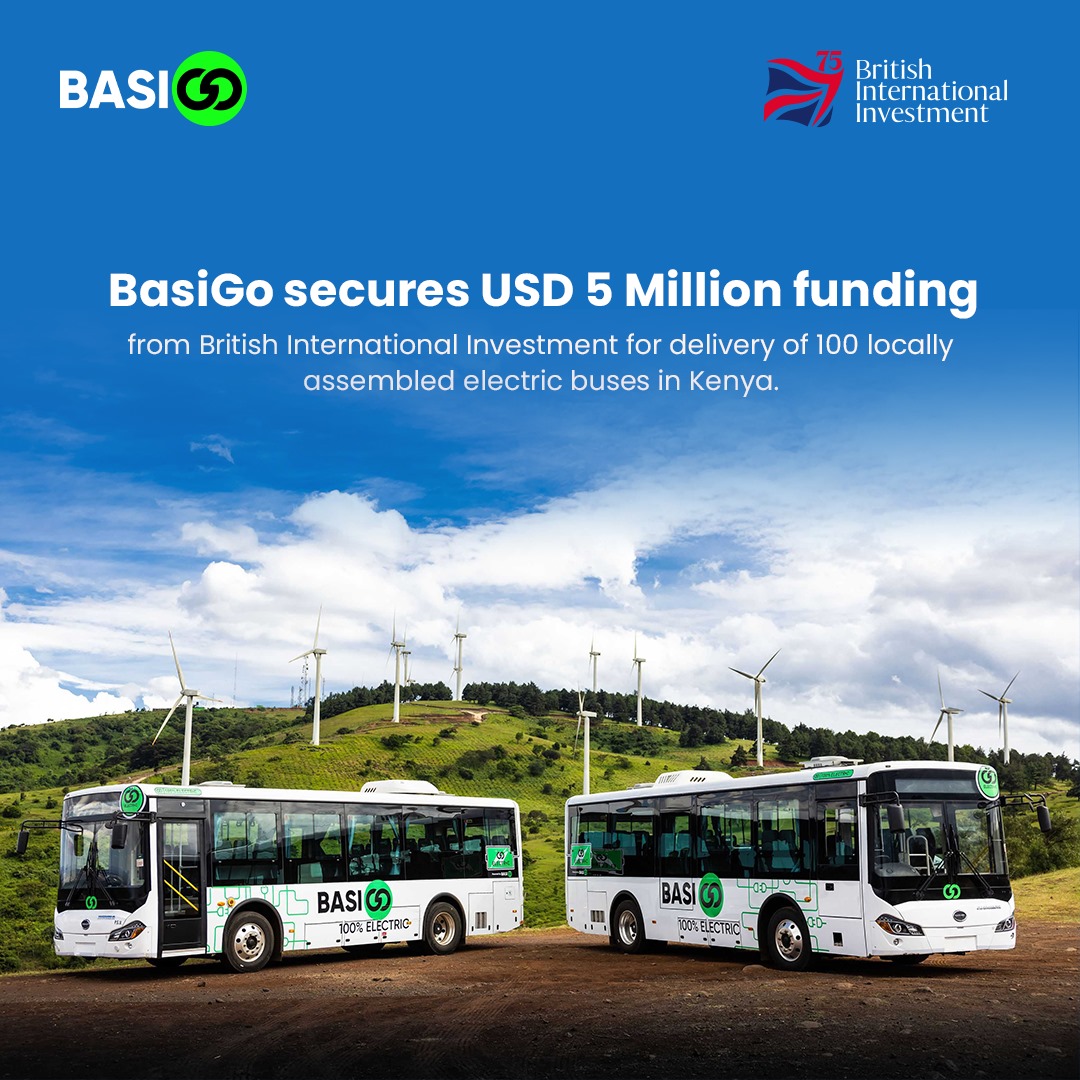Sign up for daily news updates from CleanTechnica on email. Or follow us on Google News!
BasiGo, one of Africa’s leading electric bus solution providers, has just secured $5 million in debt funding from British International Investment (BII). BII is the UK’s development finance institution and impact investor. The funding comes from BII’s Climate Innovation Facility, a catalytic program for accelerating climate innovation in emerging markets.
The $5 million investment will be used to scale local assembly of electric buses to cater to the rapidly growing demand from bus operators in Kenya. The buses will be delivered through BasiGo’s innovative Pay-As-You-Drive financing model, which enables bus operators to acquire electric buses without incurring the high upfront cost. BII’s financing support will be crucial in transitioning Kenya’s public transport from diesel-powered vehicles to modern electric buses. Each BasiGo electric bus deployed in Nairobi in place of a diesel bus mitigates over 50 tonnes of CO2 emissions per year.

BasiGo is now progressing to assemble the next set of 100 buses to add to the current 19 buses that are already active around Nairobi. BasiGo says it now has orders of close to 350 buses from bus operators in Nairobi looking to reserve the company’s first production units. BasiGo aims to deploy 1,000 locally assembled electric buses in East Africa in the next 3 years.
Here is why all of this is a really big deal! Over the last few years, 6,370 buses have been sold in Kenya (from 2018 to 2023), at an average of 1,274 a year.

The Impact The Introduction Of 350 Electric Buses In A Year Would Have On Kenya’s Bus Sector
Let us look at the impact that introducing 350 buses a year could have on the Kenyan annual bus sales market by comparing this number with some recent sales data. Looking at BasiGo’s current orders of about 350 electric buses and comparing this to the sales of ICE buses since 2018, we see that 350 would be about 5.5% of the number of buses sold during from 2018 to 2022. That shows how quickly the imminent introduction of these electric buses can have an impact.
To further highlight how much progress can be made over a brief time, the average number of buses sold over that period works out to about 1,274 buses a year. BasiGo’s orders of 350 buses would be equivalent to 27% of that. Another wonderful way of illustrating just how significant this 350 bus order can be is by looking at the most recent sales figures for 1 year (2022). The current orders of 350 buses would be about 16% of last year’s sales figures. Given that BasiGo wants to introduce over 1,000 buses over the next three years, and if we assume that the sales of electric buses will be similar to last year’s figures, it will mean that the share of electric buses in Kenya’s bus sales will jump to about 16%, which will be pretty incredible given the fact that BasiGo only started operations about two years ago. Of course, there are other players in the electric bus sector in Kenya, which will help the cause even further.

Last year, BasiGo’s fleet had 19 buses, and if we assign that to last year’s sales, it means that the share of electric buses was about 0.87%. So, as you can see, as BasiGo is now starting work to assemble the next batch of 100 electric buses, and if BasiGo can meet its target of 1,000 buses on the road in three years, we could assign 350 buses to each year, which means the share of electric buses on the annual sales will jump from the 0.87% to an awesome 16% in just a year. Now that’s an impact!
Speaking on the $5 million debt facility, Jonathan Green, Co-founder and Chief Financial Officer of BasiGo, said,
“We are thrilled to receive this catalytic financial support from BII. It is a testament to our shared commitment towards building scalable climate solutions here within Africa Because electric buses in Kenya are powered by the country’s abundance of renewable energy, electrification of public transport in Kenya holds transformative potential. Electric buses promise freedom from fuel imports, cleaner air, modern and affordable transport for the general public, and significant impact in lowering transport CO2 emissions. BII recognizes this opportunity, and their support for BasiGo will enable us to directly deliver on that promise.”
Chris Chijiutomi, Managing Director, Head of Africa at BII, added, “With 75 years of investing for impact across Africa, it is exciting to partner with businesses at the frontier of tackling climate change. BasiGo is a leader, it is revolutionising public transport in Kenya with the potential to mitigate 5 million tonnes of CO2 in Nairobi alone. BII’s Climate Innovation facility was designed to help scale impactful, innovative technologies, with the potential to transform the lives of people and communities in Africa. We are delighted to partner with BasiGo via this facility.”
BasiGo’s current fleet of 19 electric buses have driven over 1 million kilometers, carried over 1.2 million passengers, and mitigated approximately 500 tonnes of CO2 since they began operations. I can’t wait to see the next batch of 100 buses hit the road!
Image of electric buses courtesy of BasiGo
Have a tip for CleanTechnica? Want to advertise? Want to suggest a guest for our CleanTech Talk podcast? Contact us here.
CleanTechnica Holiday Wish Book
Our Latest EVObsession Video
[embedded content]
I don’t like paywalls. You don’t like paywalls. Who likes paywalls? Here at CleanTechnica, we implemented a limited paywall for a while, but it always felt wrong — and it was always tough to decide what we should put behind there. In theory, your most exclusive and best content goes behind a paywall. But then fewer people read it!! So, we’ve decided to completely nix paywalls here at CleanTechnica. But…
Thank you!
Advertisement
CleanTechnica uses affiliate links. See our policy here.
- SEO Powered Content & PR Distribution. Get Amplified Today.
- PlatoData.Network Vertical Generative Ai. Empower Yourself. Access Here.
- PlatoAiStream. Web3 Intelligence. Knowledge Amplified. Access Here.
- PlatoESG. Carbon, CleanTech, Energy, Environment, Solar, Waste Management. Access Here.
- PlatoHealth. Biotech and Clinical Trials Intelligence. Access Here.
- Source: https://cleantechnica.com/2023/12/07/basigos-electric-buses-are-starting-to-have-a-big-impact-on-kenyas-bus-sector/
- :has
- :is
- $UP
- 000
- 1
- 100
- 13
- 15%
- 19
- 2018
- 2022
- 2023
- 23
- 25
- 350
- 36
- 50
- 500
- 75
- a
- About
- abundance
- accelerating
- acquire
- across
- active
- add
- added
- Advertise
- Affiliate
- affordable
- africa
- ago
- aims
- AIR
- All
- alone
- already
- always
- an
- and
- annual
- Another
- approximately
- ARE
- around
- AS
- assembled
- Assembly
- assume
- At
- average
- BE
- because
- been
- began
- behind
- BEST
- Big
- Bit
- book
- British
- British International Investment (BII)
- Building
- bus
- Buses
- businesses
- but
- by
- CAN
- Capacity
- carried
- cater
- Cause
- change
- Chart
- chief
- Chief Financial
- chief financial officer
- chip
- cleaner
- cleantech
- Cleantech Talk
- Climate
- Climate change
- Close
- CO
- Co-founder
- co2
- co2 emissions
- comes
- commitment
- Communities
- Companies
- Company’s
- comparing
- completely
- content
- Cost
- could
- country’s
- course
- cover
- crucial
- Current
- data
- Debt
- decide
- decided
- delighted
- deliver
- delivered
- Demand
- deploy
- deployed
- designed
- Development
- development finance
- diesel
- directly
- Director
- don
- driven
- during
- each
- East
- east africa
- Electric
- embedded
- emerging
- emerging markets
- Emissions
- enable
- enables
- energy
- Engine
- Equivalent
- Ether (ETH)
- Even
- exciting
- Exclusive
- Facility
- fact
- felt
- few
- fewer
- Figures
- finance
- financial
- financing
- First
- FLEET
- For
- Freedom
- from
- Frontier
- Fuel
- funding
- further
- General
- general public
- given
- Goes
- Green
- Growing
- Guest
- had
- Have
- head
- help
- here
- High
- higher
- Highlight
- historical
- Hit
- holds
- Holiday
- How
- HTTPS
- i
- ICE
- if
- illustrating
- Impact
- impactful
- implemented
- imports
- in
- incredible
- Innovation
- innovative
- innovative technologies
- Institution
- internal
- International
- introduce
- introducing
- Introduction
- investing
- investment
- investor
- IT
- ITS
- jonathan
- jpg
- jump
- just
- kenya
- Last
- latest
- leader
- leading
- like
- likes
- Limited
- links
- Lives
- local
- locally
- Look
- looking
- lowering
- made
- managing
- Managing Director
- Market
- Markets
- max-width
- mean
- means
- Media
- Meet
- million
- Mitigate
- model
- Modern
- most
- much
- nairobi
- Need
- New
- news
- next
- now
- number
- of
- Officer
- on
- ONE
- only
- Operations
- operators
- Opportunity
- or
- order
- orders
- Other
- our
- out
- over
- partner
- People
- per
- period
- Place
- plato
- Plato Data Intelligence
- PlatoData
- player
- players
- podcast
- policy
- potential
- powered
- pretty
- Production
- Program
- Progress
- progressing
- promise
- providers
- public
- publish
- put
- quickly
- rapidly
- Read
- Reader
- really
- receive
- recent
- recognizes
- Renewable
- renewable energy
- Reserve
- revolutionising
- road
- Said
- sales
- says
- scalable
- Scale
- sector
- Secured
- see
- set
- Share
- shared
- should
- Shows
- significant
- similar
- since
- smaller
- So
- sold
- solution
- solution providers
- Solutions
- some
- started
- Starting
- Stories
- suggest
- support
- T
- tackling
- Talk
- Target
- team
- Technologies
- testament
- that
- The
- their
- then
- theory
- There.
- These
- they
- this
- three
- thrilled
- Through
- time
- tip
- to
- tough
- towards
- Transform
- transformative
- transitioning
- transport
- two
- units
- Updates
- us
- used
- uses
- Ve
- Vehicles
- via
- Video
- wait
- want
- wants
- was
- Way..
- we
- What
- which
- while
- WHO
- why
- will
- with
- within
- without
- wonderful
- Work
- works
- would
- write
- Wrong
- year
- years
- you
- Your
- youtube
- zephyrnet








